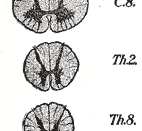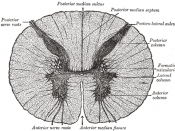-Nervous System 3 functions of the nervous system: -Receives and relays information -Monitors and responds to internal and external changes -Controls and coordinates all body functions Sensory: become aware of stimuli: change in environment Integative: memory, emotions, conscience, decisions Response: muscles, what did you do? Neuron- (nerve cell) cells that carry messages throughout the nervous system Nerve impulse- electrical signals, coded method from neuron Sensory neuron: neuron that carries impulses from the sense organs to the brain and spinal cord Motor neuron: neuron that carries impulses from the brain and spinal cord to muscles and glands Interneuron: cell that connects the motor and sensory neurons (only found in brain) Cell body- center part of the neuron that contains the nucleus and much of the cytoplasm Dendrite- part of the neuron that is an extension from the cell body of a neuron that carries impulses from the environment to the cell body Axon- long fiber that carries impulses away from the cell body of a neuron Axon terminals- small swellings in a neuron at the end of an axon that makes connections with next neuron Myelin- substance composed of liplids and protein that forms an insulated sheath around an axon, and makes a better impulse Neurilemma- outermost covering of a neuron allows nerve to grow back Threshold stimulus- minimum level of a stimulus required activating a neuron Receptor- special sensory neuron in a sense organ that receives stimuli from external environment (nose, eyes, ears) Effector- muscle of gland that brings about a coordinated response to a stimuli Synapse- point of contact at witch an impulse is passed from one cell to another Neurotransmitters- substance used by one neuron to signal another -Eye Sclera- white part of the eye that helps maintain the shape and provides muscle that moves the...
More Human Biology
essays:
Untitled
... external nares- nostrils divided by nasal septum- internal nares- opening to nasopharynx- hard palate- separates oral/nasal cavities- soft palate- posterior to hard palate- nasal conchae- projections of ...


